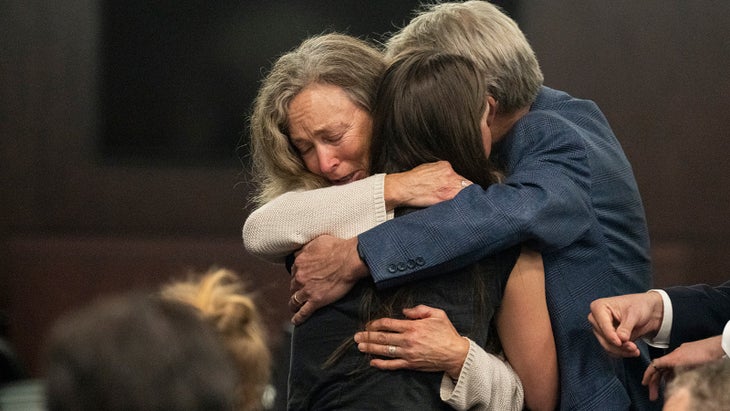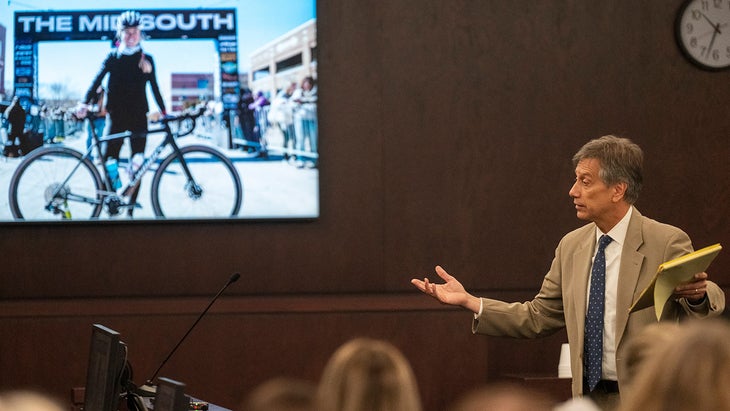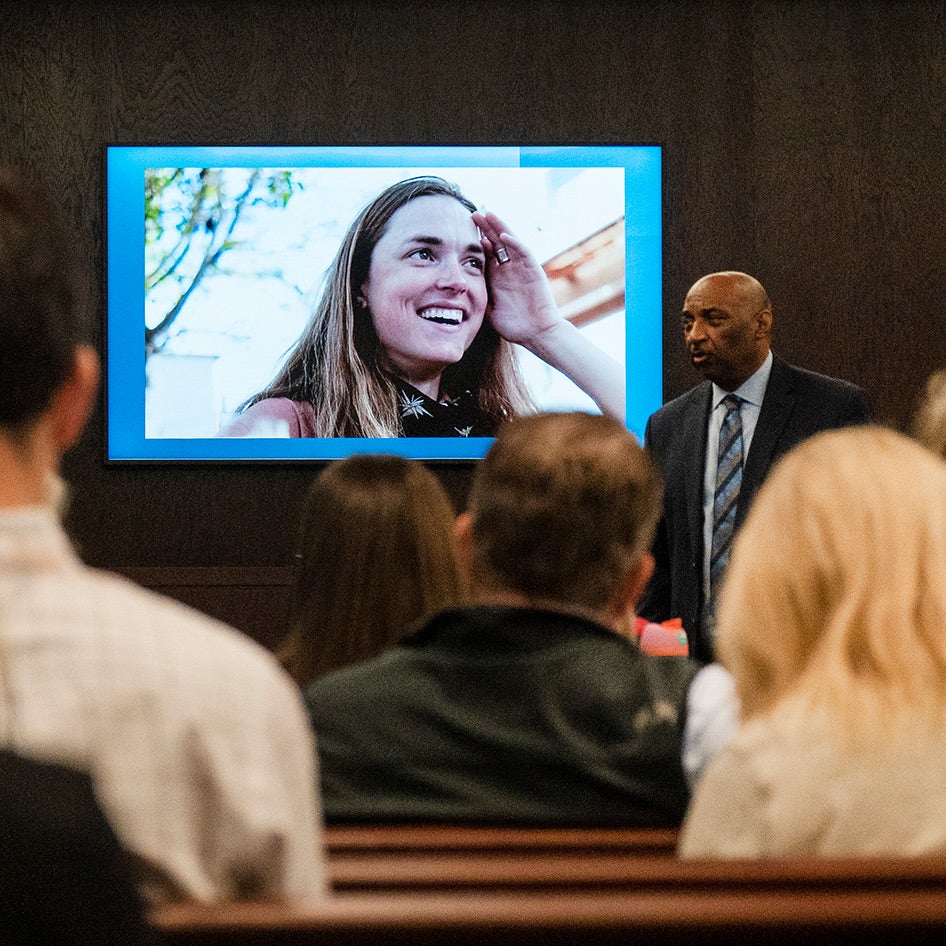The nine-day trial of Kaitlin Armstrong culminated on Thursday in Austin, Texas, with a guilty verdict for charge of first-degree murder in the shooting death of professional cyclist Moriah Wilson. Prosecutors argued that Armstrong, 35, gunned down Wilson, 25, at an apartment in east Austin on May 11, 2022. Armstrong was subsequently sentenced to 90 years in prison by a 12-member jury on November 17.
- Read about the Moriah Wilson Foundation
As judge Brenda Kennedy read the verdict, emotions inside the courtroom ranged widely. I sat near the back, alongside a group of local cyclists with personal connections to the tragedy, and watched people react. Wilson’s family and friends hugged and thanked prosecutors, while Armstrong’s younger sister, Christine, left the courtroom in tears.
I’m an active participant in the Austin cycling scene—the same community where Armstrong, and her ex-boyfriend Colin Strickland, 36, were members. I’ve also since the first days of the murder. I was compelled to watch the trial in person, to see how prosecutors presented their evidence and how the defense tried to poke holes in the case. I was also there to support the friends of mine who had been impacted by the ordeal.
In a trial overshadowed by grief, moments of intense drama, and even levity, I felt that the mountain of evidence against Armstrong simply proved overwhelming. These were the factors that, in my opinion, ultimately led to her conviction.
Damning Testimony from Friends

Two of Armstrong’s friends proved to be the strongest witnesses for the prosecution.
Before taking the stand on November 8, the trial’s fifth day, cyclist Jacqueline Chasteen told me she felt nervous and at times queasy. She hadn’t wanted to become involved in this murder case but acquiesced when called by the case’s lead detective, Richard Spitler. She said she was doing the right thing.
On the stand, Chasteen described a post-race party in Bentonville, Arkansas, in January 2022, where she and Armstrong shared a drink. At the party, Armstrong told Chasteen that she’d found out Strickland had pursued an intimate relationship with Wilson a few months prior—and that Armstrong and Strickland had been broken up when it occurred.
Chasteen also told the court that Armstrong said she’d wanted to “fucking kill” Wilson. That testimony prompted an immediate interjection from Armstrong’s defense attorney. There was a brief debate over whether Armstrong used the expletive or not. Chasteen maintained Armstrong had used the word. Judge Kennedy was visibly fighting back laughter.
Armstrong’s best friend, Nicole Mertz, provided similarly incriminating information on the stand. She testified that in the fall of 2021, as she was sharing a drink with Armstrong at the Meteor Café in South Austin, where they often hung out with other cycling friends, Armstrong confided in Mertz that she and Strickland had recently separated. And Armstrong relayed she knew he’d been hanging out with Wilson. Mertz replayed the conversation she and Armstrong had to the jury:
“What would you do if Colin started dating someone else?” Mertz asked.
“I would kill her,” Armstrong said.
More testimony came from Strickland himself, who took the stand on three separate days at the request of the prosecution and defense. He appeared anguished, mumbled his answers into the microphone, and—outside of the courtroom—wore a mask and sunglasses to obscure his face from the cameras. His testimony sometimes sounded begrudging.
Strickland provided eight hours of testimony on the trial’ fourth and fifth days. He closed his eyes as he answered, and told the court that his relationship with Armstrong was at times tumultuous. When asked to clarify by the defense, he described a personal turmoil—his inability to commit to Armstrong. Strickland said he began to hide his correspondence with Wilson, because he knew Armstrong felt disrespected and upset. But he felt he had a right to maintain a professional relationship with a female colleague at the top of their shared sport.
Prosecutors asked Strickland about specific incidents that exemplified Armstrong’s jealousy of Wilson. His testimony also connected Armstrong to the vehicle seen in surveillance footage at the crime scene. The State presented a slow-motion video message sent from Armstrong to Strickland that shows her practicing at a local range with the gun he bought her. To which Armstrong added via text: “The recoil is too intense.”
Under oath, Strickland said that at the time of Wilson’s murder, he loved Armstrong.
“And she loved you, too?” prosecutor Guillermo Gonzalez asked.
“I believed so,” Strickland responded.
After his full day of testimony, Strickland appeared to become angry with the news media. At one point, he went out of his way to nudge a cameraman, and in another instance stepped on the man’s foot.
GPS Data That Proved Crucial

Ultimately, the State’s GPS data and DNA evidence irrefutably proved that Armstrong was at the murder scene. On the trial’s sixth day, Austin Police Department detective Daniel Portnoy presented an animation of tracking data from the Uconnect navigation system in Armstrong’s vehicle; the video showed her SUV circling the East Austin apartment where Wilson was staying for over an hour, then parking nearby moments before Wilson returned from a dinner outing with Strickland.
A surveillance camera later captured audio of Wilson screaming, then two gunshots, and then a third, seconds later. Two minutes after Wilson was killed, the animation of Armstrong’s vehicle showed the SUV driving back to Strickland’s home.
Armstrong’s defense, meanwhile, never provided an explanation of her whereabouts at the time of Wilson’s murder.
On the trial’s eighth day, two different experts testified that Armstrong’s DNA was found on the handlebars and seat of Wilson’s bicycle, which was discovered in the bushes outside of the apartment where the murder took place. Strickland’s DNA, meanwhile, was not present on Wilson’s bike, making the possibility of Armstrong’s DNA transfer via Strickland highly unlikely.
Emotional Moments
Throughout the trial, as well as during the closing statements and verdict, the jury witnessed multiple moments of intense emotion. One of the heaviest scenes happened on day one: Caitlin Cash, one of Moriah Wilson’s closest friends who Wilson was staying with in Austin, recounted how she’d come home on the evening of May 11 to find Wilson prone on the bathroom floor of her apartment. At first, Cash explained, she thought Wilson was just stretching on the tile floor because it was so hot. But as she drew closer, she saw all the blood.
As the prosecution played her call to 911, Cash began to cry.
“One, two, three…” Cash counted over the phone as the operator coached her through chest compressions. Cash interjected, “Her brains are leaking.” But the operator urged her to keep going until the medics arrived.
In a second testimony, during the sentencing portion of the trial, Cash said she’d moved back into the apartment. When asked why, Cash said she wanted to face the darkness. She didn’t want the violence that occurred there to have control over her.
I’d never met Cash, but we share a friend in the bike racing community: Rheannon Cunningham, who is also a police detective. On the trial’s opening day I saw Cunningham at the court—she looked shaken as she waited in the courtroom’s lobby for the proceedings to begin. Throughout the trial, Armstrong’s defense, led by attorney Rick Cofer, challenged the investigative work of her colleagues.
Facing a record-high homicide rate in the capital and diminished staff, the Austin Police Department and lead detective Rick Spitler admitted to having made mistakes during the initial investigation of Armstrong. Notably, after being brought in on a valid misdemeanor warrant, Armstrong was allowed to leave the police station due to confusion over her correct birth date.
Moriah Wilson’s father, Eric, says integrity & honesty is so important in personal relationships. This comes after the woman convicted of killing his daughter, Kaitlin Armstrong, was sentenced to 90 years in prison.
— Mills Hayes (@MillsHayesTV)
On the stand, Spitler staunchly defended his work, which ultimately led to a warrant for Armstrong and her capture in Costa Rica, where Armstrong fled following Wilson’s murder. Spitler watched from the back of the courtroom as Armstrong was found guilty.
During the victim-impact portion of the sentencing, Wilson’s brother, Matt Wilson, detailed their tight sibling bond. “My sister had her life taken from her for no reason at all,” he said. After Armstrong was sentenced, Moriah’s father, Matt Wilson, read a to the reporters gathered outside the courthouse.
Armstrong’s younger sister, Christie, was the last witness to testify. She took the stand in an effort to humanize her sister to the jury ahead of their sentencing deliberation. She spoke directly to Kaitlin, who helped raise Christie in their single-parent home, and said, “I’ve always looked up to you.”
On cross-examination, prosecutor Rickey Jones asked Christie if she saw Matt Wilson’s best friend, Moriah Wilson, in the courtroom. Christie replied no. To which Jones said, “His best friend is not here because your sister killed her.”


